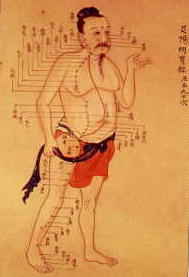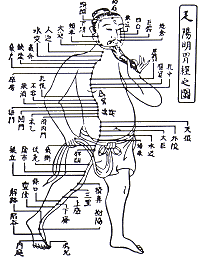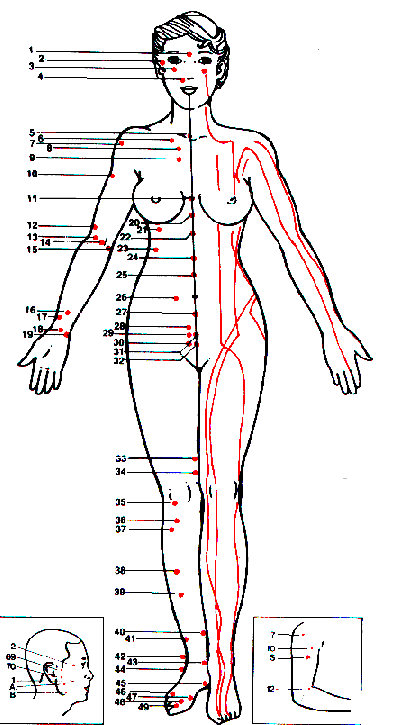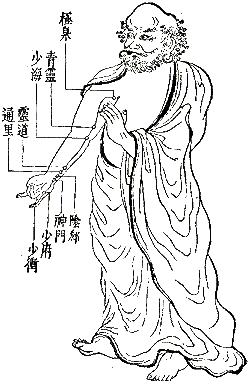|
Acupuncture One has to marvel at the breadth of the human imagination and drive to experiment. I mean, who the hell ever came up with the idea of sticking needles into people to make them healthier? What is the thought process that goes into this?
One has to marvel at the breadth of the human imagination and drive to experiment. I mean, who the hell ever came up with the idea of sticking needles into people to make them healthier? What is the thought process that goes into this?Even more interesting is the question of how the hell anyone figured out a way that it could possibly work, two thousand years before the technology existed to look at something as small as a nerve. While a patient's willingness to undergo acupuncture can vary wildly due to the psychological ramifications of getting stuck with needles, the actual effectiveness of the technique is not in question. Acupuncture works, and works quite well. The practice dates back at least 2,000 years to ancient China. According to traditional beliefs, acupuncture is used on key parts of the body which relate to the flow of chi, which Taoists believe is a quantifiable life force flowing through the body. By sticking gigantor needles (ranging from half an inch to several inches in length) into the skin at these various points, the acupuncturist corrects imbalances in the flow of yin and yang energy in the patient. Once inserted (to different lengths based on the desired effect), the needles can be manipulated in any number of ways, often by spinning, twisting or vibrating them. The proven result can be anything from anesthesia to muscular relaxation to euphoria, and proponents of the practice often claim even greater benefits, treating everything from hay fever to blindness with the sharp prick of a pin (or pins). Traditional acupuncture is often accompanied by a less quantifiable practice called moxabustion, in which wormwood tree leaves are burned for their healing vapors. The practice of acupuncture continued with very little variation for millennia before being discovered by Western medicine in the 1970s, a decade in which all things old and scientifically unproven suddenly became now and happening.
There are three really amazing things about acupuncture:
The amazing thing about how acupuncture works is that, in scientific terms, it works for no fucking reason. Or at least no discernible reason. The most that modern research has been able to determine is that the points on the skin where the needles go have a lower electrical resistance than the rest of the skin. In scientific terms, that means sticking a needle in the spot will do absolutely fucking nothing. Or rather, nothing we actually understand. There have been a lot of theories about exactly what the hell is going on here, but most of them lack a certain quality that the scientists call "making much sense." Nevertheless, thousands of U.S. doctors and hundreds of thousands of medical professionals around the world believe acupuncture works, and many use it as part of their medical practices. Even hardcore skeptics grudgingly admit that there appear to be some benefits.
A recent study in Germany suggested that the electrical resistance issue is at the heart of the situation. In one of the most extensive examinations of the effects of acupuncture ever, doctors rendered a series of patients unconscious, stuck acupuncture needles into their bodies, then pinched, prodded and generally hurt them while measuring their brain activity. The study found that acupuncture substantially mutes the pain signals sent to the brain but doesn't completely eliminate them. The scientists suggested that acupuncture reduces the flow of electrical impulses along nervous pathways. Which leads us to the second amazing thing about acupuncture: That it works at all. Despite extensive and expensive research on the subject of how the nervous system uses a form of electricity to transmit information, there's nothing on the books that even remotely resembles the effect at work here. Nor is there a reasonable physics explanation for why sticking a pin would affect electrical resistance at all. This isn't the same as saying there's a scientific reason why it WOULDN'T work, of course, just that there's no know reason why it WOULD. Which, in turn, leads to the third point: How the hell did anyone figure this out? The ancient Chinese were admittedly an ingenious and intelligent bunch. They invented gunpowder, the printing press and spaghetti. But sticking needles in the body to produce anesthesia or fix diarrhea? First, you have to have people sitting around thinking how great it would be to stick needles into people. Then, they have to figure out what kind of needles—the needles used in acupuncture have exceedingly fine points which slip into the skin usually without even drawing blood. This is two thousand years ago, so they have to figure out some sort of sterilization. Then, they have to figure out where to stick them and what to do with them once they're stuck. The question of "where to stick them" is probably the most interesting and challenging of all these concepts. The average human body has about 20 square feet of skin, while the tip of an acupuncture needle is practically microscopic. By simple trial and error, it would take decades or longer to test each part of the body for a response to the needle, and this would require a test subject with a rather extraordinary amount of patience or masochism. Since electricity (and the devices used to measure it) had not been discovered yet, there's little chance that the ancient Chinese could even have articulated the concept, let alone found a way to exploit it. There were no interferometers in ancient China. Inevitably, the inquiring mind must ask: So what about this chi thing?
Is there such a thing as chi? Does it relate to what Westerners call a soul? There's no basis in traditional science that comfortably accommodates the stuff, but it's worth noting that chi is integral to several practices which are indisputably effective on a pragmatic and measurable level, including many forms of martial arts and yoga. If you accept that there's chi, or even if you stick with calling it electrical resistance, then there's still the sticky question of how one FINDS it. The traditional sensory apparatus doesn't immediately seem to be equipped to receive this data. In the end, there are more or less two explanations that a rational person is forced to choose between They are:
This is a daunting notion, of course, so most people just don't go there, and chalk the practice of acupuncture up to a general feel-good New Age kind of credulity which they also often extend to practices and concepts that are debatably or demonstrably bogus, from chiropractice to physiognomy to homeopathy to psychic surgery. Lumping acupuncture in with the latter does the practice a grave disservice. Getting into the chi issue upsets so many applecarts that no one really wants to go there. It's probably better to just relax and go with the flow. After all, you probably don't really understand how your television works. But you still watch The Simpsons twice a night in syndication. Is that really so different having a needle stuck in your back?
|
 Unlike such dalliances as
Unlike such dalliances as  A few have argued that acupuncture's benefits are simply the result of the placebo effect, but the body of evidence suggests something else is going on, and there's a widespread movement in medical circles to promote the use of acupuncture and concoct some sort of explanation which will get the aforementioned skeptics to quit bellyaching.
A few have argued that acupuncture's benefits are simply the result of the placebo effect, but the body of evidence suggests something else is going on, and there's a widespread movement in medical circles to promote the use of acupuncture and concoct some sort of explanation which will get the aforementioned skeptics to quit bellyaching.  Since there's a measurable electrical variation in the skin at the points designated for acupuncture, it's quite possible that there is some sort of variation in other energetic qualities of the various weird little electromagnetic fields the body throws off as part of its normal functioning.
Since there's a measurable electrical variation in the skin at the points designated for acupuncture, it's quite possible that there is some sort of variation in other energetic qualities of the various weird little electromagnetic fields the body throws off as part of its normal functioning.